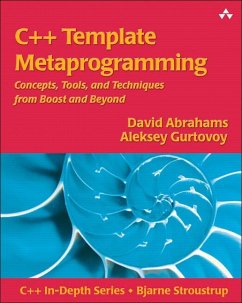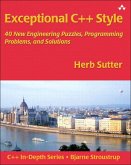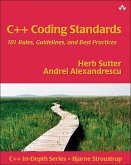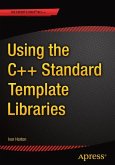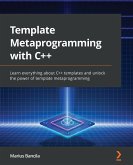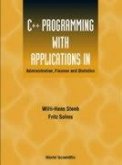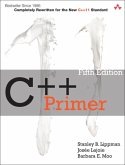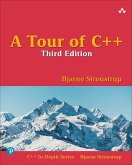At long last, this much-awaited book delivers practical metaprogramming into the hands of the everyday C++ programmer. Simply put, a metaprogram is a program which generates or manipulates program code. The ability to programmatically create software allows programmers to work at a higher level of abstraction appropriate to the problem domain, and allows the resulting code to be reconfigured without loss of efficiency. Ever since generic programming was introduced to C++, programmers have discovered myriad "template tricks" for manipulating programs *as they are compiled*, effectively eliminating the barrier between program and metaprogram. While the excitement generated by these capabilities among C++ experts has reached the community at large, their practical application remains out-of-reach for most programmers. This book provides the neccessary foundation to make template metaprogramming practical for everyone.
Product Description
Abrahams and Gurtovoy have written something close to a classic. marvelous fun to read.
Read the complete book review by Jack J. Woehr, Dr. Dobbs Journal, June 03, 2005
If you're like me, you're excited by what people do with template metaprogramming (TMP) but are frustrated at the lack of clear guidance and powerful tools. Well, this is the book we've been waiting for. With help from the excellent Boost Metaprogramming Library, David and Aleksey take TMP from the laboratory to the workplace with readable prose and practical examples, showing that compile-time STL is as able as its runtime counterpart. Serving as a tutorial as well as a handbook for experts, this is the book on C++ template metaprogramming.
-Chuck Allison, Editor, The C++ Source
C++ Template Metaprogramming sheds light on the most powerful idioms of today's C++, at long last delivering practical metaprogramming tools and techniques into the hands of the everyday programmer.
A metaprogram is a program that generates or manipulates program code. Ever since generic programming was introduced to C++, programmers have discovered myriad template tricks for manipulating programs as they are compiled, effectively eliminating the barrier between program and metaprogram. While excitement among C++ experts about these capabilities has reached the community at large, their practical application remains out of reach for most programmers. This book explains what metaprogramming is and how it is best used. It provides the foundation you'll need to use the template metaprogramming effectively in your own work.
This book is aimed at any programmer who is comfortable with idioms of the Standard Template Library (STL). C++ power-users will gain a new insight into their existing work and a new fluency in the domain of metaprogramming. Intermediate-level programmers who have learned a few advanced template techniques will see where these tricks fit in the big picture and will gain the conceptual foundation to use them with discipline. Programmers who have caught the scent of metaprogramming, but for whom it is still mysterious, will finally gain a clear understanding of how, when, and why it works. All readers will leave with a new tool of unprecedented power at their disposal-the Boost Metaprogramming Library.
The companion CD-ROM contains all Boost C++ libraries, including the Boost Metaprogramming Library and its reference documentation, along with all of the book's sample code and extensive supplementary material.
Features + Benefits
At long last, this much-awaited book delivers practical metaprogramming into the hands of the everyday C++ programmer.
° Presents the C++ Metaprogramming Library (MPL), a framework of powerful tools providing unprecedented new capability to the C++ power-user.
° Bjarne Stroustrup gave the equivalent of a blank check to the authors--meaning that he would accept anything they wrote into his Series, given their overwhelming expertise in this domain.
° CD-ROM contains the entire Boost Library.
Backcover
Abrahams and Gurtovoy have written something close to a classic. marvelous fun to read.
Read the complete book review by Jack J. Woehr, Dr. Dobbs Journal, June 03, 2005
If you're like me, you're excited by what people do with template metaprogramming (TMP) but are frustrated at the lack of clear guidance and powerful tools. Well, this is the book we've been waiting for. With help from the excellent Boost Metaprogramming Library, David and Aleksey take TMP from the laboratory to the workplace with readable prose and practical examples, showing that compile-time STL is as able as its runtime counterpart. Serving as a tutorial as well as a handbook for experts, this is the book on C++ template metaprogramming.
-Chuck Allison, Editor, The C++ Source
C++ Template Metaprogramming sheds light on the most powerful idioms of today's C++, at long last delivering practical metaprogramming tools and techniques into the hands of the everyday programmer.
A metaprogram is a program that generates or manipulates program code. Ever since generic programming was introduced to C++, programmers have discovered myriad template tricks for manipulating programs as they are compiled, effectively eliminating the barrier between program and metaprogram. While excitement among C++ experts about these capabilities has reached the community at large, their practical application remains out of reach for most programmers. This book explains what metaprogramming is and how it is best used. It provides the foundation you'll need to use the template metaprogramming effectively in your own work.
This book is aimed at any programmer who is comfortable with idioms of the Standard Template Library (STL). C++ power-users will gain a new insight into their existing work and a new fluency in the domain of metaprogramming. Intermediate-level programmers who have learned a few advanced template techniques will see where these tricks fit in the big picture and will gain the conceptual foundation to use them with discipline. Programmers who have caught the scent of metaprogramming, but for whom it is still mysterious, will finally gain a clear understanding of how, when, and why it works. All readers will leave with a new tool of unprecedented power at their disposal-the Boost Metaprogramming Library.
The companion CD-ROM contains all Boost C++ libraries, including the Boost Metaprogramming Library and its reference documentation, along with all of the book's sample code and extensive supplementary material.
Preface.
Acknowledgments.
Making the Most of This Book.
1. Introduction.
Getting Started.
So What's a Metaprogram?
Metaprogramming in the Host Language.
Metaprogramming in C++.
Why Metaprogramming?
When Metaprogramming?
Why a Metaprogramming Library?
2. Traits and Type Manipulation.
Type Associations.
Metafunctions.
Numerical Metafunctions.
Making Choices at Compile Time.
A Brief Tour of the Boost Type Traits Library.
Nullary Metafunctions.
Metafunction Definition.
History.
Details.
Exercises.
3. A Deeper Look at Metafunctions.
Dimensional Analysis.
Higher-Order Metafunctions.
Handling Placeholders.
More Lambda Capabilities.
Lambda Details.
Details.
Exercises.
4. Integral Type Wrappers and Operations.
Boolean Wrappers and Operations.
Integer Wrappers and Operations.
Exercises.
5. Sequences and Iterators.
Concepts.
Sequences and Algorithms.
Iterators.
Iterator Concepts.
Sequence Concepts.
Sequence Equality.
Intrinsic Sequence Operations.
Sequence Classes.
Integral Sequence Wrappers.
Sequence Derivation.
Writing Your Own Sequence.
Details.
Exercises.
6. Algorithms.
Algorithms, Idioms, Reuse, and Abstraction.
Algorithms in the MPL.
Inserters.
Fundamental Sequence Algorithms.
Querying Algorithms.
Sequence Building Algorithms.
Writing Your Own Algorithms.
Details.
Exercises.
7. Views and Iterator Adaptors.
A Few Examples.
View Concept.
Iterator Adaptors.
Writing Your Own View.
History.
Exercises.
8. Diagnostics.
Debugging the Error Novel.
Using Tools for Diagnostic Analysis.
Intentional Diagnostic Generation.
History.
Details.
Exercises.
9. Crossing the Compile-Time/Runtime Boundary.
for each.
Implementation Selection.
Object Generators.
Structure Selection.
Class Composition.
(Member) Function Pointers as Template Arguments.
Type Erasure.
The Curiously Recurring Template Pattern.
Explicitly Managing the Overload Set.
The sizeof Trick.
Summary.
Exercises.
10. Domain-Specific Embedded Languages.
A Little Language.
Goes a Long Way.
DSLs, Inside Out.
C++ as the Host Language.
Blitz++ and Expression Templates.
General-Purpose DSELs.
The Boost Spirit Library.
Summary.
Exercises.
11. A DSEL DesignWalkthrough.
Finite State Machines.
Framework Design Goals.
Framework Interface Basics.
Choosing a DSL.
Implementation.
Analysis.
Language Directions.
Exercises.
Appendix A. An Introduction to Preprocessor Metaprogramming.
Motivation.
Fundamental Abstractions of the Preprocessor.
Preprocessor Library Structure.
Preprocessor Library Abstractions.
Exercise.
Appendix B. The typename and template Keywords.
The Issue.
The Rules.
Appendix C. Compile-Time Performance.
The Computational Model.
Managing Compilation Time.
The Tests.
Appendix D. MPL Portability Summary.
Bibliography.
Index.
Simply put, a metaprogram is a program which generates or manipulates
program code. The ability to programmatically create software allows
programmers to work at a higher level of abstraction appropriate to the
problem domain, and allows the resulting code to be reconfigured without loss
of efficiency. Ever since generic programming was introduced to C++,
programmers have discovered myriad template tricks for manipulating
programs *as they are compiled*, effectively eliminating the barrier between
program and metaprogram. While the excitement generated by these
capabilities among C++ experts has reached the community at large, their
practical application remains out-of-reach for most programmers. This book
provides the neccessary foundation to make template metaprogramming
practical for everyone.
Product Description
Abrahams and Gurtovoy have written something close to a classic. marvelous fun to read.
Read the complete book review by Jack J. Woehr, Dr. Dobbs Journal, June 03, 2005
If you're like me, you're excited by what people do with template metaprogramming (TMP) but are frustrated at the lack of clear guidance and powerful tools. Well, this is the book we've been waiting for. With help from the excellent Boost Metaprogramming Library, David and Aleksey take TMP from the laboratory to the workplace with readable prose and practical examples, showing that compile-time STL is as able as its runtime counterpart. Serving as a tutorial as well as a handbook for experts, this is the book on C++ template metaprogramming.
-Chuck Allison, Editor, The C++ Source
C++ Template Metaprogramming sheds light on the most powerful idioms of today's C++, at long last delivering practical metaprogramming tools and techniques into the hands of the everyday programmer.
A metaprogram is a program that generates or manipulates program code. Ever since generic programming was introduced to C++, programmers have discovered myriad template tricks for manipulating programs as they are compiled, effectively eliminating the barrier between program and metaprogram. While excitement among C++ experts about these capabilities has reached the community at large, their practical application remains out of reach for most programmers. This book explains what metaprogramming is and how it is best used. It provides the foundation you'll need to use the template metaprogramming effectively in your own work.
This book is aimed at any programmer who is comfortable with idioms of the Standard Template Library (STL). C++ power-users will gain a new insight into their existing work and a new fluency in the domain of metaprogramming. Intermediate-level programmers who have learned a few advanced template techniques will see where these tricks fit in the big picture and will gain the conceptual foundation to use them with discipline. Programmers who have caught the scent of metaprogramming, but for whom it is still mysterious, will finally gain a clear understanding of how, when, and why it works. All readers will leave with a new tool of unprecedented power at their disposal-the Boost Metaprogramming Library.
The companion CD-ROM contains all Boost C++ libraries, including the Boost Metaprogramming Library and its reference documentation, along with all of the book's sample code and extensive supplementary material.
Features + Benefits
At long last, this much-awaited book delivers practical metaprogramming into the hands of the everyday C++ programmer.
° Presents the C++ Metaprogramming Library (MPL), a framework of powerful tools providing unprecedented new capability to the C++ power-user.
° Bjarne Stroustrup gave the equivalent of a blank check to the authors--meaning that he would accept anything they wrote into his Series, given their overwhelming expertise in this domain.
° CD-ROM contains the entire Boost Library.
Backcover
Abrahams and Gurtovoy have written something close to a classic. marvelous fun to read.
Read the complete book review by Jack J. Woehr, Dr. Dobbs Journal, June 03, 2005
If you're like me, you're excited by what people do with template metaprogramming (TMP) but are frustrated at the lack of clear guidance and powerful tools. Well, this is the book we've been waiting for. With help from the excellent Boost Metaprogramming Library, David and Aleksey take TMP from the laboratory to the workplace with readable prose and practical examples, showing that compile-time STL is as able as its runtime counterpart. Serving as a tutorial as well as a handbook for experts, this is the book on C++ template metaprogramming.
-Chuck Allison, Editor, The C++ Source
C++ Template Metaprogramming sheds light on the most powerful idioms of today's C++, at long last delivering practical metaprogramming tools and techniques into the hands of the everyday programmer.
A metaprogram is a program that generates or manipulates program code. Ever since generic programming was introduced to C++, programmers have discovered myriad template tricks for manipulating programs as they are compiled, effectively eliminating the barrier between program and metaprogram. While excitement among C++ experts about these capabilities has reached the community at large, their practical application remains out of reach for most programmers. This book explains what metaprogramming is and how it is best used. It provides the foundation you'll need to use the template metaprogramming effectively in your own work.
This book is aimed at any programmer who is comfortable with idioms of the Standard Template Library (STL). C++ power-users will gain a new insight into their existing work and a new fluency in the domain of metaprogramming. Intermediate-level programmers who have learned a few advanced template techniques will see where these tricks fit in the big picture and will gain the conceptual foundation to use them with discipline. Programmers who have caught the scent of metaprogramming, but for whom it is still mysterious, will finally gain a clear understanding of how, when, and why it works. All readers will leave with a new tool of unprecedented power at their disposal-the Boost Metaprogramming Library.
The companion CD-ROM contains all Boost C++ libraries, including the Boost Metaprogramming Library and its reference documentation, along with all of the book's sample code and extensive supplementary material.
Preface.
Acknowledgments.
Making the Most of This Book.
1. Introduction.
Getting Started.
So What's a Metaprogram?
Metaprogramming in the Host Language.
Metaprogramming in C++.
Why Metaprogramming?
When Metaprogramming?
Why a Metaprogramming Library?
2. Traits and Type Manipulation.
Type Associations.
Metafunctions.
Numerical Metafunctions.
Making Choices at Compile Time.
A Brief Tour of the Boost Type Traits Library.
Nullary Metafunctions.
Metafunction Definition.
History.
Details.
Exercises.
3. A Deeper Look at Metafunctions.
Dimensional Analysis.
Higher-Order Metafunctions.
Handling Placeholders.
More Lambda Capabilities.
Lambda Details.
Details.
Exercises.
4. Integral Type Wrappers and Operations.
Boolean Wrappers and Operations.
Integer Wrappers and Operations.
Exercises.
5. Sequences and Iterators.
Concepts.
Sequences and Algorithms.
Iterators.
Iterator Concepts.
Sequence Concepts.
Sequence Equality.
Intrinsic Sequence Operations.
Sequence Classes.
Integral Sequence Wrappers.
Sequence Derivation.
Writing Your Own Sequence.
Details.
Exercises.
6. Algorithms.
Algorithms, Idioms, Reuse, and Abstraction.
Algorithms in the MPL.
Inserters.
Fundamental Sequence Algorithms.
Querying Algorithms.
Sequence Building Algorithms.
Writing Your Own Algorithms.
Details.
Exercises.
7. Views and Iterator Adaptors.
A Few Examples.
View Concept.
Iterator Adaptors.
Writing Your Own View.
History.
Exercises.
8. Diagnostics.
Debugging the Error Novel.
Using Tools for Diagnostic Analysis.
Intentional Diagnostic Generation.
History.
Details.
Exercises.
9. Crossing the Compile-Time/Runtime Boundary.
for each.
Implementation Selection.
Object Generators.
Structure Selection.
Class Composition.
(Member) Function Pointers as Template Arguments.
Type Erasure.
The Curiously Recurring Template Pattern.
Explicitly Managing the Overload Set.
The sizeof Trick.
Summary.
Exercises.
10. Domain-Specific Embedded Languages.
A Little Language.
Goes a Long Way.
DSLs, Inside Out.
C++ as the Host Language.
Blitz++ and Expression Templates.
General-Purpose DSELs.
The Boost Spirit Library.
Summary.
Exercises.
11. A DSEL DesignWalkthrough.
Finite State Machines.
Framework Design Goals.
Framework Interface Basics.
Choosing a DSL.
Implementation.
Analysis.
Language Directions.
Exercises.
Appendix A. An Introduction to Preprocessor Metaprogramming.
Motivation.
Fundamental Abstractions of the Preprocessor.
Preprocessor Library Structure.
Preprocessor Library Abstractions.
Exercise.
Appendix B. The typename and template Keywords.
The Issue.
The Rules.
Appendix C. Compile-Time Performance.
The Computational Model.
Managing Compilation Time.
The Tests.
Appendix D. MPL Portability Summary.
Bibliography.
Index.
Simply put, a metaprogram is a program which generates or manipulates
program code. The ability to programmatically create software allows
programmers to work at a higher level of abstraction appropriate to the
problem domain, and allows the resulting code to be reconfigured without loss
of efficiency. Ever since generic programming was introduced to C++,
programmers have discovered myriad template tricks for manipulating
programs *as they are compiled*, effectively eliminating the barrier between
program and metaprogram. While the excitement generated by these
capabilities among C++ experts has reached the community at large, their
practical application remains out-of-reach for most programmers. This book
provides the neccessary foundation to make template metaprogramming
practical for everyone.

